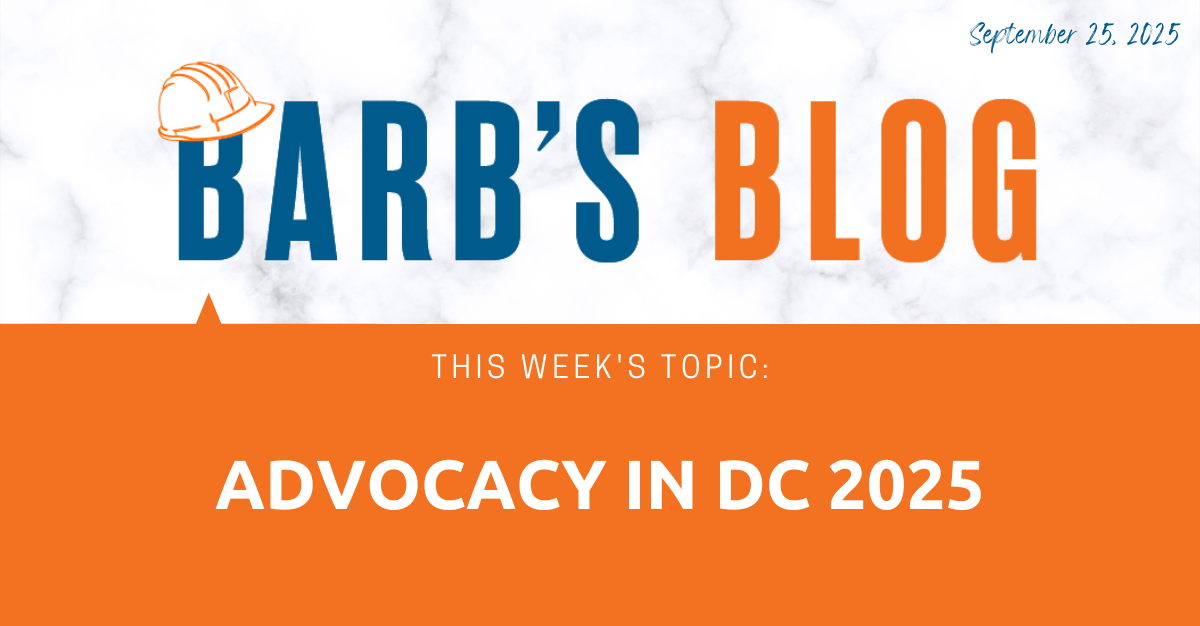
Advocating in D.C. 2025
Last week, the Association of Women Contractors (AWC) again joined the Minnesota Transportation Alliance for its D.C. Fly-In event. Held in Washington, D.C., this annual trip focused on the critical need for transportation funding in Minnesota. The attendees included representatives from contractors, counties, cities, and engineering firms.
Along with our partner, Associated General Contractors of Minnesota (AGC of MN), AWC brings the contractors’ voice to the table. Our central message was that funding is not just for roads and bridges; it is an investment in the businesses and people that build them. It was an opportunity for us to share construction specific issues while discussing the need to fund them. We shared our story with the Minnesota Delegation of U.S. Senators and Representatives, as well as with the event’s other attendees.
Each year, we tailor a specific message to address the concerns of our members and industry. The AWC/Contractor group last week was represented by me and:
- Kendra Kron, Owner of InSite Contracting
- Deb Brisk, Owner of DRB Consulting
- Liz Ennenga, Owner of Quad E Companies
- Jennifer Hildebrandt, President/CEO of PE Services
- Laura Ziegler, Director of Highway Heavy Government Affair of AGC of MN
Led by Laura with AGC, we discussed issues affecting the industry such as work zone safety and the need for a national effort for precise locate and marking of underground utilities. Having Liz and Kendra in the room explaining how this effects their employees and businesses added the impact narrative to the conversation.
While we were advocating for the reauthorization of the surface transportation bill in 2026, we were very focused on the critical need to reauthorize the DBE program as part of that bill. The DBE program was enacted to remove barriers to participation of DBEs in federal assisted contracting and has been reauthorized without contention since 1983. However, the legal decisions of the past 2 years have removed presumptions of race and gender disadvantage, the Mid-America Milling vs US DOT case, this administration’s executive orders terminating DEI within the federal government, and the responses in the private sector for fear of lawsuits have changed that. The DBE program is at risk now.
Something is Better than Nothing
AWC has not only been watching the shift in the legal landscape but has been engaged in what solutions might exist. I know that without a program our members will lose access to opportunities in contracting.
Our message in DC is how critical it is to have a program, even if it is race and gender neutral. What does that mean? It means moving to a disadvantaged small business program irrespective of race and gender. The Board has examined the threats to our membership with this approach, but believe the risk is greater if we lose DBE and other programs.
We also contend that the SBA size standards are so large that they are not targeting most small businesses in this marketplace. We advocated for a tiered approach by adding an emerging small business at 50% of the current SBA size standard (or another data driven emerging threshold).
Our strategy is to:
- Mitigate legal risk: It reduces the risk of legal challenges and the potential loss of the entire program by moving away from racial and gender presumptions that are increasingly under legal attack.
- Protect existing programs: By proactively adapting the program we ensure that a version of the program survives, protecting opportunities for members that would be lost if the current DBE programs were struck down.
- Improve targeting: A tiered system based on size standards can more effectively target relief to the specific small businesses that need it most, rather than letting larger small businesses benefit from broad SBA standards.
It was a heavy decision to move forward with this strategy, and AWC did not come to it lightly. During our meetings in DC, both Democratic and Republican members of the delegation expressed an understanding that changes to our programs are unavoidable. I know this is hard news, and I want you to know that I feel the pain in this pivot. If a path existed that allowed us to maintain the status quo, I would have championed it. For anyone who wishes to discuss their concerns, please feel free to reach out to me, AWC Board members, or the other advocates who joined me in Washington.
—B
